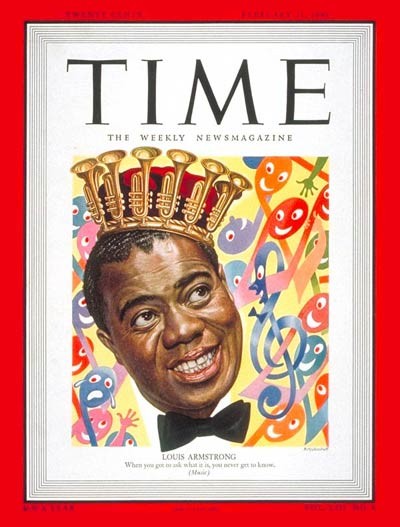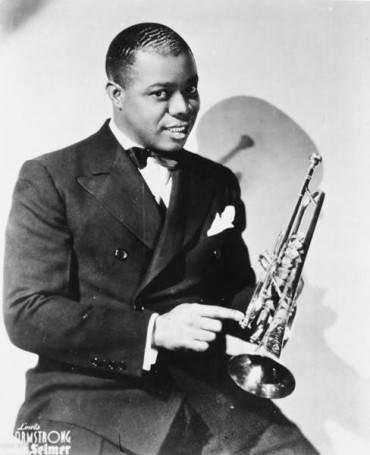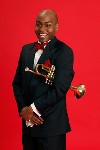Louis Armstrong: Jazz Ambassador in New York
Jeremy Giraud Abram is Satchmo in Myla Churchill's Play
By: Susan Hall - Nov 05, 2012
Louis Armstrong: Jazz Ambassador
By Myla Churchill
Directed by Carlos Armesto
Musical Direction and Arrangements by Carsten Rubeling and Jeff D’Antona
Choreographed by Byron Easley
Jeremy Giraud Abram (Louis Armstrong)
Featuring the Queens College Hot Six: Drew Coles, Jeff D’Antona, Guido Gonzalez, George Kostopoulos, Carsten Rubeling, Maruo Satalino.
Drew Francis (Set Design), Ariel J. Benjamin (Lighting Design), Leslie Bernstein (Costume Design), Chares Coes and Nathan A. Banks (Sound Design),
Presented by MakingBooksSing in collaboration with The Louis Armstrong House Museum and the Aaron Copeland School of Music, Queens College.
Myla Churchill’s play, Louis Armstrong: Jazz Ambassador, opens with Louis in purgatory, bargaining with Big Daddy/God to enter the pearly gates. His life has not been lived on a straight line to heaven, but this Louis reckons his good outweighs the bad. He still has to persuade God. Churchill crafts her play with a musician’s ear and an historian’s depth.
In the lead role of this one-handled monodrama accompanied by Gabriel's band posed on clouds on the stage, Jeremy Giraud Abram gives an irresistible star turn. From them moment he enters, he engages your eyes, your ears and especially your heart. Dancing in his spiffed up spats and tux, he becomes Armstrong.
The band, featuring Queens College’s Hot Six and aptly selected Armstrong songs are just what you want to hear as you wait for God to make up his mind about the greatest jazz musician of the twentieth century.
Abram captures the distinctive gravelly growl of the Armstrong voice, which he reports Armstrong was unable to disguise even when he appeared before the blindfolded panel of What's My Line, and simply grunted. Armstrong says that he tried to grunt at a high pitch, but even that failed.
In photographs, you see that Armstrong's face was not as close to the wide-eyed, ear-to-ear minstrel’s as it so often appeared.
In Churchill’s take, Armstrong uses the dozens, or snaps, as an indication of his rough origins and also to start pleading his case. From his childhood in the segregated South, this language is rough as the play's gets in presenting the life of a complex man, a man who was often called 'Uncle Tom' by his own people.
Calling out the ‘dozens’ is like saying 'nigger' (not mentioned once in this play), okay for insiders to use, but outsiders beware. 'Dipper Mouth (Armstrong's childhood nickname) 'Dipper Mouth, 'yo mama's so ugly she could make an onion cry.' Kids in Harlem still tease, ''Yo teeth are so yellow puts the sun out of style.'
But not the pearly whites of Abram as he prances around the stage, swooping and dipping while he implores God to forgive his sins and let him enter heaven. God’s growl is deeper and louder than Armstrong’s and often terrifies.
Seeing Abram post performance makes clear that he molds his own quiet face to come alive as a close replica of Armstrong's. So too his speaking and singing voice. Abram’s is a wonderful invitation into Armstrong's world, his feeling for the supremacy of music, and its capacity to heal wherever.
A stadium is named after Armstrong at the US Tennis Center, where great African American tennis player Arthur Ashe gets star stadium treatment and not so coincidentally, a prominent nude statue which the USTA tries to cover with green growth. Despite the ascendance of superb American players Venus and Serena Williams, tennis remains white shoe, as does most of the country. Yet the airport in New Orleans, Armstrong's birthplace, is named for the trumpeter. We are still the world in which Armstrong so brilliantly succeeded.
The Gershwins’ Porgy and Bess was presented in Moscow in 1955, the first American production mounted since the 1917 Revolution. Armstrong did not want outsiders around the world to think that all was well in the United States.
In the second story of Churchill’s play we learn of Armstrong’s cancellation of an 'ambassadorial' tour because he wanted President Eisenhower to take note and throttle Governor Faubus of Arkansas. Faubus claimed, despite the 1954 Supreme Court decision in Brown v Board of Education, that separate but unequal was satisfactory.
Armstrong argued that it wasn’t and helped to force the President to send in troops to make sure African American children could safely attend integrated schools. This part of Armstrong’s life is not well known and serves to counter the reputation he got after he went blackface as a Zulu King in New Orleans, 1949.
The third segment shows how he roused the ire of fellow members of his race when he appeared crowned on the cover of Time as Zulu King in the Mardi Gras parade. Not that carrying a banana stalk scepter and wearing a lard-can crown was so bad, but the marchers wore unacceptable blackface. Ruby Dee, Ozzie Davis and other performers have objected to roles James Earl Jones has undertaken along the way, including his portrayal of Paul Robeson. Racial issues are often most heated among one’s own.
Can Armstrong negotiate his way out of this transgression? God knows that Oprah claimed Zulu heritage until the head of Harvard's African American department informed her that she was no Zulu princess, and had not a trace of Zulu blood. She wept on hearing the news.
Times change, but Armstrong’s place in history, musical and otherwise, has only grown larger. The Churchill take, written for children of all ages, does not show Armstrong's cruder side, his language free of the blunt, plainspoken words he often used. But the play certainly captures his race-defying charge through life blowing his horn and singing.
Through slips and slides, Armstrong finally gains entry to heaven, into which he marches with invited members of the audience to his hometown’s anthem, When the Saints Come Marching In. Even if the marathon was not run in New York on Sunday, Abram, Churchill and MakingBooksSing won their race in Louis Armstrong.




